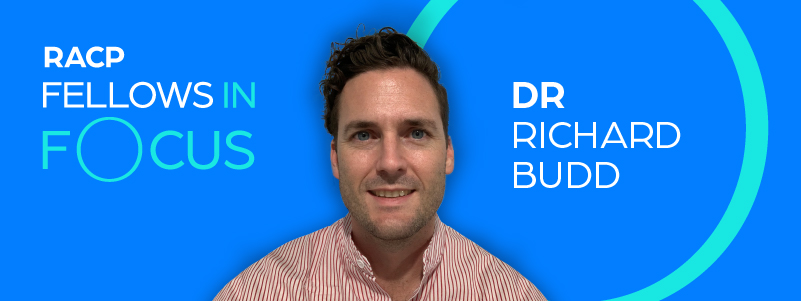RACP Fellows in Focus: Dr Richard Budd
Date published:
05 Oct 2021

It’s not often you find doctors willing to swap one extreme for another, but that’s exactly what Dr Richard Budd did in 2016. He left behind the gloomy, wind-driven weather of the United Kingdom and substituted it for rural, often warm, Katherine, Northern Territory. This transition was not without its challenges, “It’s been a seismic shift. I left when it was snowing in November and landed in 40-degree heat in the Northern Territory. The change has been an enormous culture shock for me. 70 per cent of my patients identify as Aboriginal, and they come from very remote settings. Many don't speak English as a first language and live in places that have preserved language and culturally, which is amazing. However, learning about how to practice in a culturally sensitive way, which is ongoing learning for me, was probably one of the greatest challenges.”
Richard provides an outreach service to all the remote communities in the Katherine region and uses telehealth to provide continuity of care in-between visits. “The main reason I became a specialist was because I had some specialist consultant colleagues who were mentors to me, whom I respected and was inspired by. There was one in particular, who was a respiratory physician who just had an amazing knowledge base and a great sense of humour. I respected him greatly. I knew I wanted to remain in the hospital system and work within that team.”
“I love complexity and problem-solving. I feel that medicine gives me that great challenge to try and pick apart. Why is this person presenting in this way? What can I use to try and treat, resolve or prevent progression? How can I use my knowledge or the latest research? Using information, my own experience, assistance from colleagues, as well as a good evidence base, I try to move forward from that. That’s the nuts and bolts of medicine really. Complex problem-solving. It’s really quite rewarding to get to the bottom of that. Then there's medicine in general. Depending on what specialty you want to be, there's the human aspect of it and being able to engage with people, assist them, reassure and communicate effectively are all skill sets that I think doctors need to have.”
However, despite the obvious challenges of switching landmass and weather systems, like many before Richard, working in the Northern Territory has presented endless opportunities. “I have an amazing job. I live in a town that is completely different to any place that I've worked in before. I get to visit remote communities and spend anywhere from about 20 to 30 days a year in remote community settings, where I’m in my patients' homes. It’s a good example of culturally secure practice. That is, not pulling people away from a place they're familiar with, but trying to provide healthcare that they want and for what's important to them. Accepting that in some instances, maybe that's not the best evidence-based practice, but I alter my practice to give them the care that they want and where they want.”
“Dislodging people from their families and their community is a recurring theme currently and historically. If there's anything that I've learned, it’s that deep-rooted attachment to country and family transcends anything I've experienced in my own culture, so it’s enormously important. People make decisions that aren't the optimal therapy, that may even result in shortening their lives, but you need to give them information in a way that can be understood and allow them to make educated decisions. You must learn to provide care in the best way you can within that community, but also have some peace with that. It can be challenging.”
For those seeking or interested in the challenging but hugely rewarding career path that Richard has been fortunate enough to find himself on, he offered some advice to future Fellows, “If you have an interest in Aboriginal and Torres Strait Islander health, you should spend some of your training working in a hospital that has a predominantly Indigenous population surrounded by people that have a real keen interest in Aboriginal and Torres Strait Islander health. There's a number of places, particularly through the north of Australia, that would value you at whatever level of training you’re at.”
Richard went on to say, “we need to make sure that people see this as a viable training and career path. I don't think that a lot of people going down the specialist training pathway consider this as an option. You can try it out as an experience, but is this actually a career pathway that you’d want to pursue? And that comes down to us as rurally practicing physicians recruiting trainees and using platforms like this to have our voice heard. I think this is a wonderful career path. It is the most rewarding job I've ever had, and the lifestyle is amazing. I live in some of the most beautiful tropical parts of the country and lead a very fulfilling life here.”